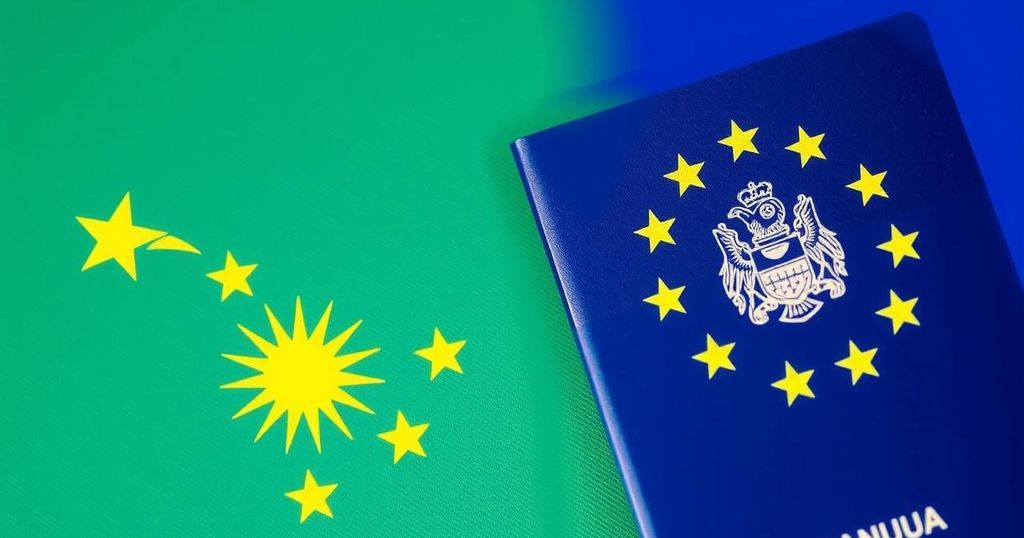Lessons on Citizenship by Investment: Vanuatu’s EU Consequences for Pacific Neighbors

Vanuatu recently lost its visa-free access to the EU Schengen area due to concerns over its citizenship by investment (CBI) program, prompting security evaluations by the EU. This situation has become a cautionary tale for other Pacific nations, particularly Solomon Islands and Nauru, as they explore similar CBI schemes. The need for strict vetting processes and the preservation of national sovereignty are underscored as lessons from Vanuatu’s experience.
Recently, Vanuatu became the first nation to lose its visa-free access to the Schengen area of the European Union (EU), following a critical resolution by the European Parliament. This decision, articulated by rapporteur Paulo Cunha, was prompted by Vanuatu’s insufficient cooperation in countering security risks associated with its citizenship by investment (CBI) program. The program’s lack of stringent vetting procedures has raised concerns regarding potential threats to European security, with Cunha stating, “Vanuatu has been selling its citizenship and abusing the European Union’s trust.”
Currently, Vanuatu is marketed as offering one of the fastest and simplest CBI programs globally, at a cost of around $150,000. Other nations in the region, such as the Solomon Islands and Nauru, appear to be exploring similar CBI initiatives. The Solomon Islands has drafted a bill for a CBI program, appealing to the visa-free travel offered by their green passports, while Nauru’s Minister for Climate Change announced plans for a CBI scheme aimed at securing climate finance for the island.
While countries may find CBI schemes appealing as a means to boost revenue and provide financial security, the consequences of mismanagement are stark. Vanuatu’s experience has shown that inadequate processes can lead to loss of international standing and economic impacts. This cautionary tale serves as a relevant guide for the Solomon Islands and Nauru as they contemplate similar measures. The preservation of national sovereignty and the careful management of security risks must be a priority in any CBI initiative to avoid the pitfalls encountered by Vanuatu.
As illustrated by Vanuatu’s case, insensitivity to historical and cultural sentiments may alienate stakeholders; local chiefs were notably distressed by the commodification of citizenship. Furthermore, the necessity of specialized skills and regulatory frameworks cannot be overstated. For Solomon Islands and Nauru to succeed with CBI schemes, they will need to partner with reputable private entities that can provide the technical expertise and resources necessary to properly vet applicants and ensure security compliance. Failure to do so may replicate Vanuatu’s damaging experience, compromising both their economic aspirations and international relationships.
The issue of Citizenship by Investment (CBI) programs has gained traction among various nations, particularly those within the Pacific region. Vanuatu’s recent loss of its visa-free access to the EU Schengen area highlights the risks associated with poorly managed CBI schemes, particularly the potential for security threats and the need for stringent vetting processes. Other Pacific nations, such as Solomon Islands and Nauru, are now considering similar programs as a means to increase revenue and address financial challenges but must heed the lessons from Vanuatu’s experience to ensure process integrity and political stability are maintained.
In conclusion, the recent developments surrounding Vanuatu’s CBI program serve as a crucial warning for Solomon Islands and Nauru. While the potential financial benefits of such schemes are enticing, the importance of thorough vetting and regulatory frameworks cannot be overstated. Any plans to implement CBI initiatives must carefully consider the broader implications for national sovereignty, security, and international relations to avoid repeating the mistakes made by Vanuatu.
Original Source: www.rnz.co.nz








